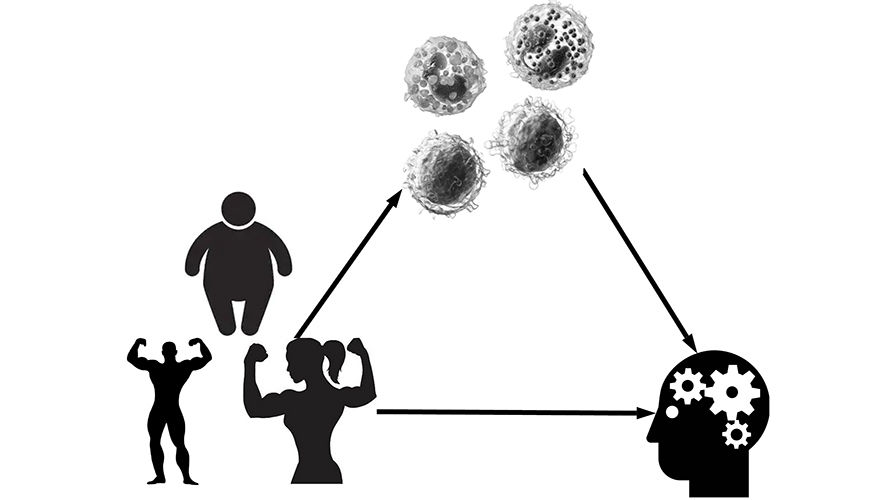Study finds link between higher BMI in older adults and lower fluid intelligence
Results from a study conducted by assistant professor Auriel Willette and his research team suggest immune cells may link body composition to how cognition changes as we age.
January 26, 2020
A new study from Iowa State researchers looked at the effects of body fat on the way people think.
Iowa State researchers found that less muscle and more body fat may affect how flexible people’s thinking gets as they become older, and changes in parts of the immune system could be responsible. These findings could lead to new treatments that help maintain mental flexibility in aging adults with obesity, sedentary lifestyles or muscle loss that naturally happens with aging.
The study, led by Auriel Willette, assistant professor of food science and human nutrition, and Brandon Klinedinst, doctorate student in neuroscience, looked at data from more than 4,000 middle-aged to older UK Biobank participants of men and women. The researchers examined direct measurements of lean muscle mass, abdominal fat and subcutaneous fat and how they were related to changes in fluid intelligence over six years.
“Fluid intelligence involves being able to think and reason abstractly and solve problems,” according to verywellmind.com. “This ability is considered independent of learning, experience and education.”
Willette and Klinedinst discovered people — mostly in their 40s and 50s — who had higher amounts of fat in their mid-section had worse fluid intelligence as they got older. In contrast, greater muscle mass appeared to be a protective factor. These relationships stayed the same even after taking into account chronological age, level of education and socioeconomic status.
“Chronological age doesn’t seem to be a factor in fluid intelligence decreasing over time,” Willette said in a press release. “It appears to be biological age, which here, is the amount of fat and muscle.”
The study also looked at whether or not changes in immune system activity could explain links between fat or muscle and fluid intelligence. Previous studies cited in this study have shown that people with a higher body mass index (BMI) have more immune system activity in their blood, which activates the immune system in the brain and causes problems with cognition. BMI only takes into account total body mass, so it has not been clear whether fat, muscle or both jump-start the immune system.
For women in this study, the link between more abdominal fat and worse fluid intelligence was explained by changes in two types of white blood cells: lymphocytes and eosinophils.
Lymphocytes are very important in the immune system, with T cells being responsible for directly killing many foreign invaders. B lymphocytes, in contrast to the other types of white blood cells, are responsible for humoral immunity. They produce the antibodies that “remember” an infection and stand ready in case your body should be exposed, according to verywellhealth.com.
Eosinophils play an important role in fighting off bacteria and are very important in responding to infections with parasites. They are perhaps best known for their role in allergy symptoms, when they essentially go overboard in mounting an immune response against something like pollen, which it mistakenly believes is an invader, according to verywellhealth.com.
For men, a completely different type of white blood cell, basophils, explained roughly half of the fat and fluid intelligence link. While muscle mass was protective, the immune system did not seem to play a role.
Basophils are important in mounting a non-specific immune response to pathogens. These cells are perhaps best known for their role in asthma. When stimulated, these cells release histamine, among other chemicals. The products can result in inflammation in the airways, according to verywellhealth.com.
Generally, people begin to gain fat and lose lean muscle once they hit middle age, a trend that continues as they get older. To overcome this, implementing exercise routines to maintain lean muscle becomes more important. Klinedinst said exercising, especially resistance training, is essential for middle-aged women, who naturally tend to have less muscle mass than men.
“If you eat alright and do at least brisk walking some of the time, it might help you with mentally staying quick on your feet,” Willette said in a press release.







